Insights from international climate finance cases

After one year, an IKI project provides new insights into financing climate-friendly development in developing countries.
How can international climate finance (ICF) contribute to transformational change in developing countries? What can we learn from existing projects of international climate finance? These were central questions, which the German Institute for Economic Research (DIW Berlin), with its national and international implementing research partners, jointly addressed in their first recently published cross-country study.
IKI support to strengthen national climate policy implementation
The study titled, “Transformational change towards low-carbon development in emerging economies: insights from international climate finance cases”, is a first major output of the IKI project “Strengthen national climate policy implementation: Comparative empirical learning & creating linkage to climate finance (SNAPFI). DIW is implementing the research-based and policy advisory and capacity building project with think tanks in Brazil (Center for Sustainability Studies of Fundação Getulio Vargas - FGVces), India (The Energy and Resources Institute), Indonesia (the Climate Change Center, Institut Teknologi Bandung) and South Africa (the University of Cape Town).
The findings of the cross-country studies were presented and discussed at a virtual seminar in July this year with more than 65 participants. The main insights and conclusions of twelve in-depth case studies were presented as well as discussed by panellists including Rajani Ranjan Rashmi, (distinguished Fellow at TERI, India), Samantha Keen ( University of Cape Town, South Africa) and Klaus Oppermann (Senior Economist at the World Bank).
Throughout the discussion, it became clear that domestic public policy, stakeholder support and the involvement of the private sector are core elements to achieve transformational change. Prof. Karsten Neuhoff, head of the Climate Policy Department at DIW, summarized the virtual seminar saying, “International climate finance can provide targeted support for specific domestic needs. It can facilitate transformative change of sectors and policies if integrated with factors like institutional innovation, stakeholder participation and political will”.
Insights of the country studies from Brazil, Indonesia, India and South Africa
Each national partner also worked on topics relevant to the climate policy and finance interface in contexts of the Nationally Determined Contributions (NDCs). The findings of these country studies were also published recently and results will be presented and discussed on national virtual seminars that will take place in September and October 2020.
In the Brazilian country study, researchers at FGVces identified the barriers that must be overcome in order to unlock private investments for the railway sector in Brazil. Legal insecurity and the large amount of investments required for railway projects were cited by the interviewees as the main challenges to the attraction of direct investments for the sector. Other barriers, such as the legal impediments preventing the private sector from proposing new railway projects, were also discussed, although with conflicting views between interviewees.
The Indonesia country study identified several challenges in the energy sector of achieving NDC, such as the coal and natural gas dilemma. Furthermore, the researchers from Institut Teknologi Bandung (ITB) identified the need for an integrated legal framework, which supports investments towards renewable energy development and increased transparency and coordination amongst key institutions. Indonesia is then at a crossroad to balance between managing domestic energy demand, committing to emission reduction to achieve NDC target, and achieving energy sovereignty through potential sources of energy.
In India, the steel and cement industries struggle to reduce carbon emissions, which make up a significant amount of the country’s overall emissions. However, many leading companies have taken voluntary climate actions, steel and cement companies still lack internal capacity to finance their transition. TERI’s research found there to be a need for companies enabled by a supportive policy framework, to build a case for green investment and generate demand for green products, by building the capacity, at both the borrowers and the lenders level.
South Africa’s Just Transition Transaction fund would pay the additional costs of an accelerated phase out of coal-fired power, and fund development projects supporting affected communities and workers. The transaction would contribute to financial sustainability in South Africa’s electricity sector in a manner that promotes social justice. The researchers at the University of Cape Town found that it is critical that local actors are central to defining the just transition.
Insights from finance and climate policy development at EU-level
IKEM’s project aims to assess the link between the EU-level finance and climate policy development in EU Member States. The study highlights the importance of negotiation accompanied by extensive analytical and consultation processes. It was concluded, that maximum alignment of climate with national socio-economic objectives and long-term budget planning are crucial for implementing effective international climate policy.
DIW and the national research partners already started working on the second cross country and five new country studies. Results will be published and discussed in the third quarter of 2021.
The link has been copied to the clipboard
Contact
IKI Office
Zukunft – Umwelt – Gesellschaft (ZUG) gGmbH
Stresemannstraße 69-71
10963 Berlin
Studies overview
-
Barriers to attracting direct and capital market investments for railway infrastructure in Brazil
-
Strengthening the Indonesian climate governance in energy sector towards achieving the NDC target
-
Transitioning India's steel and cement industries to low carbon pathways
-
Climate finance to transform energy infrastructure as part of a just transition in South Africa






